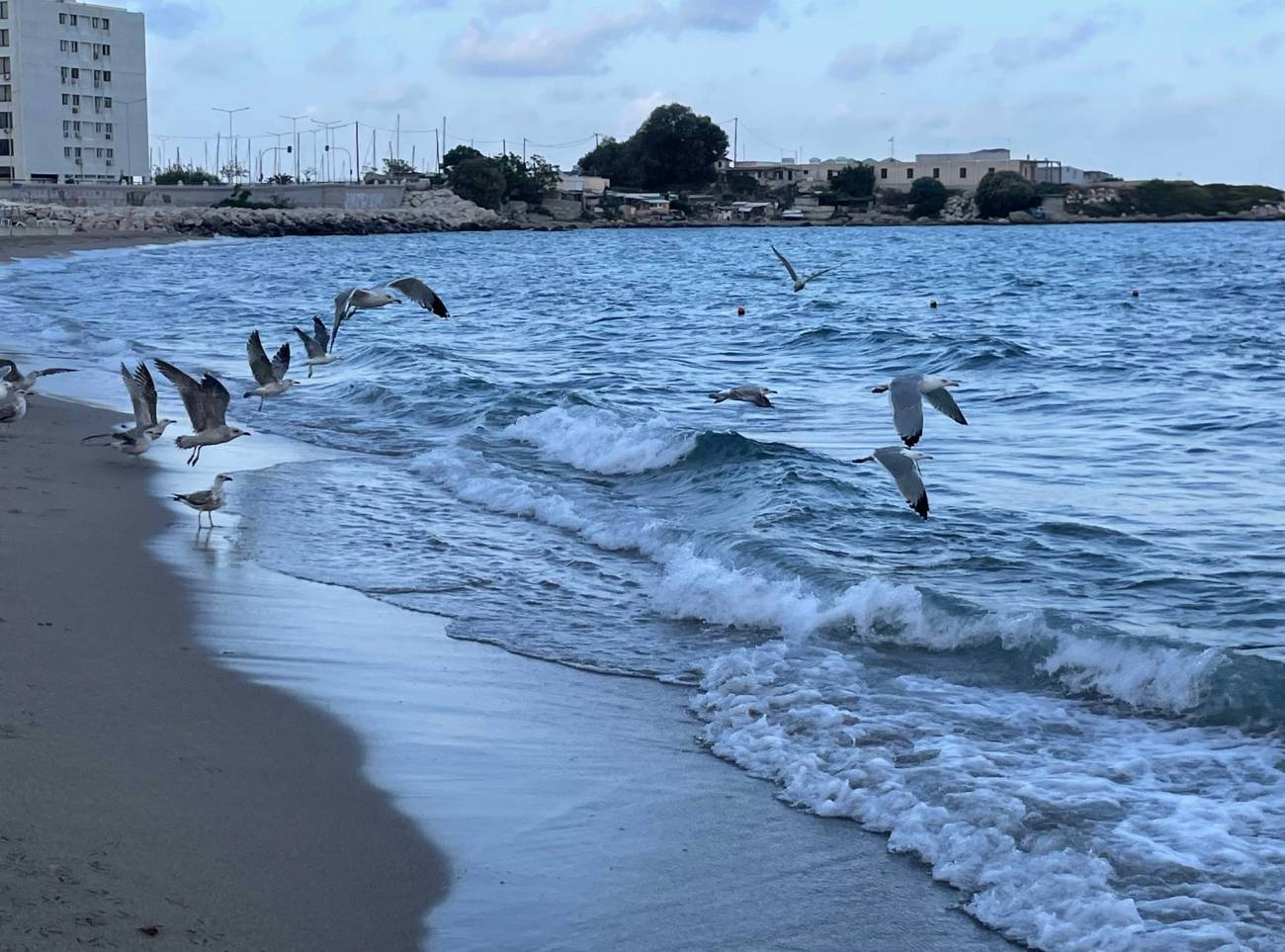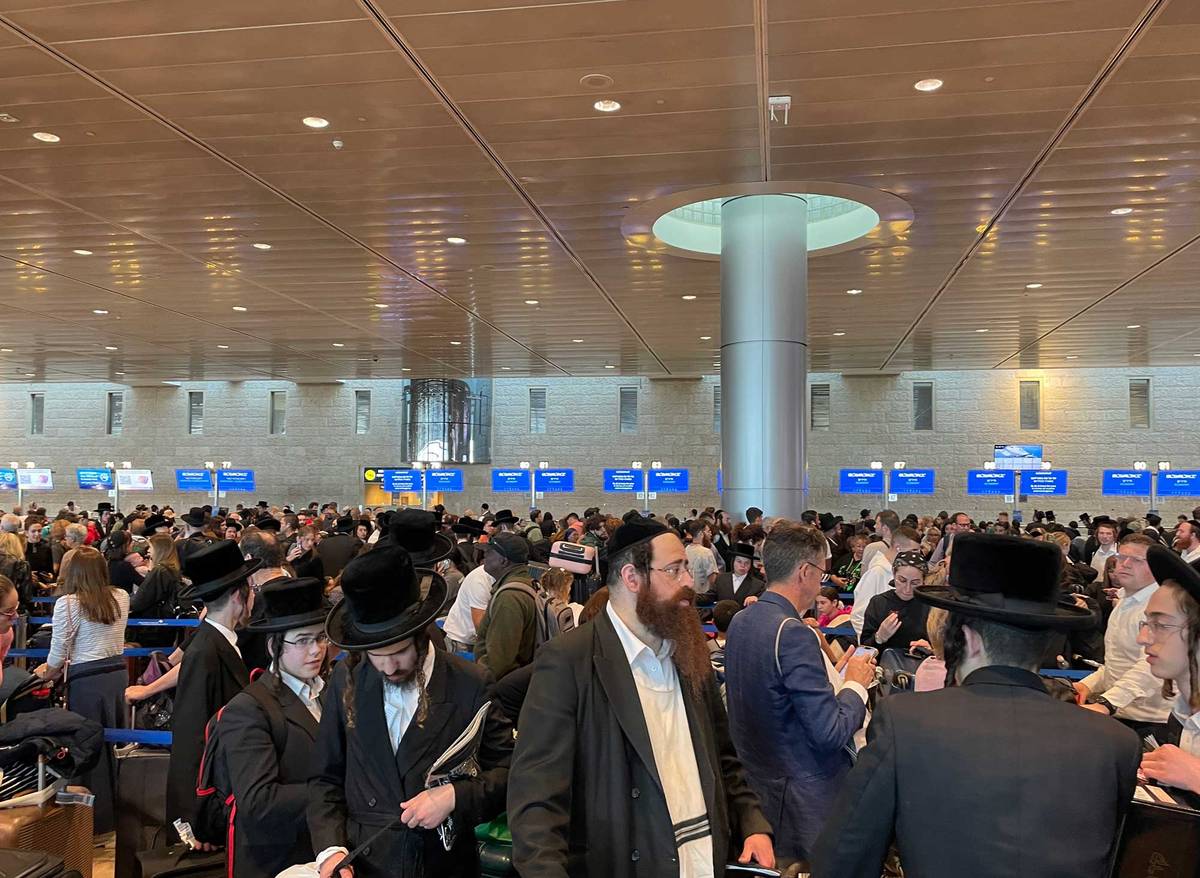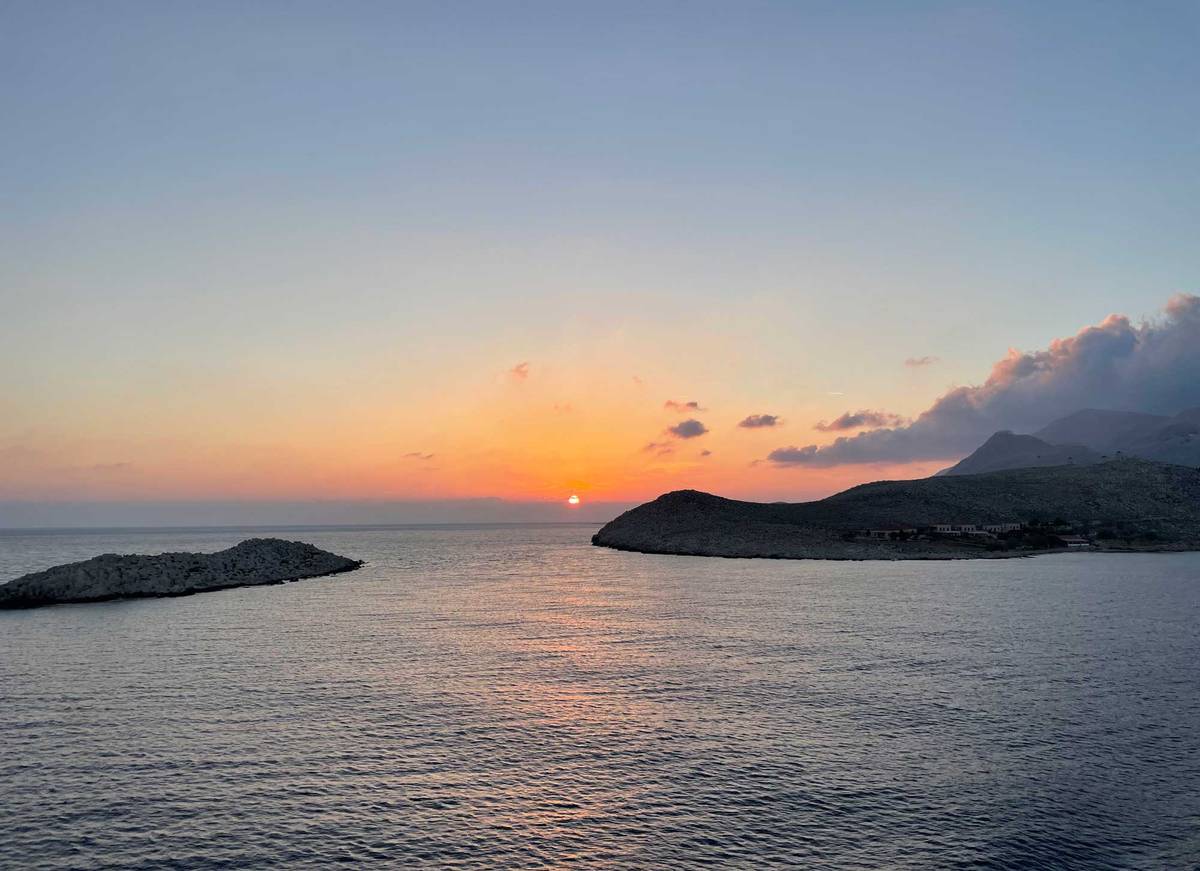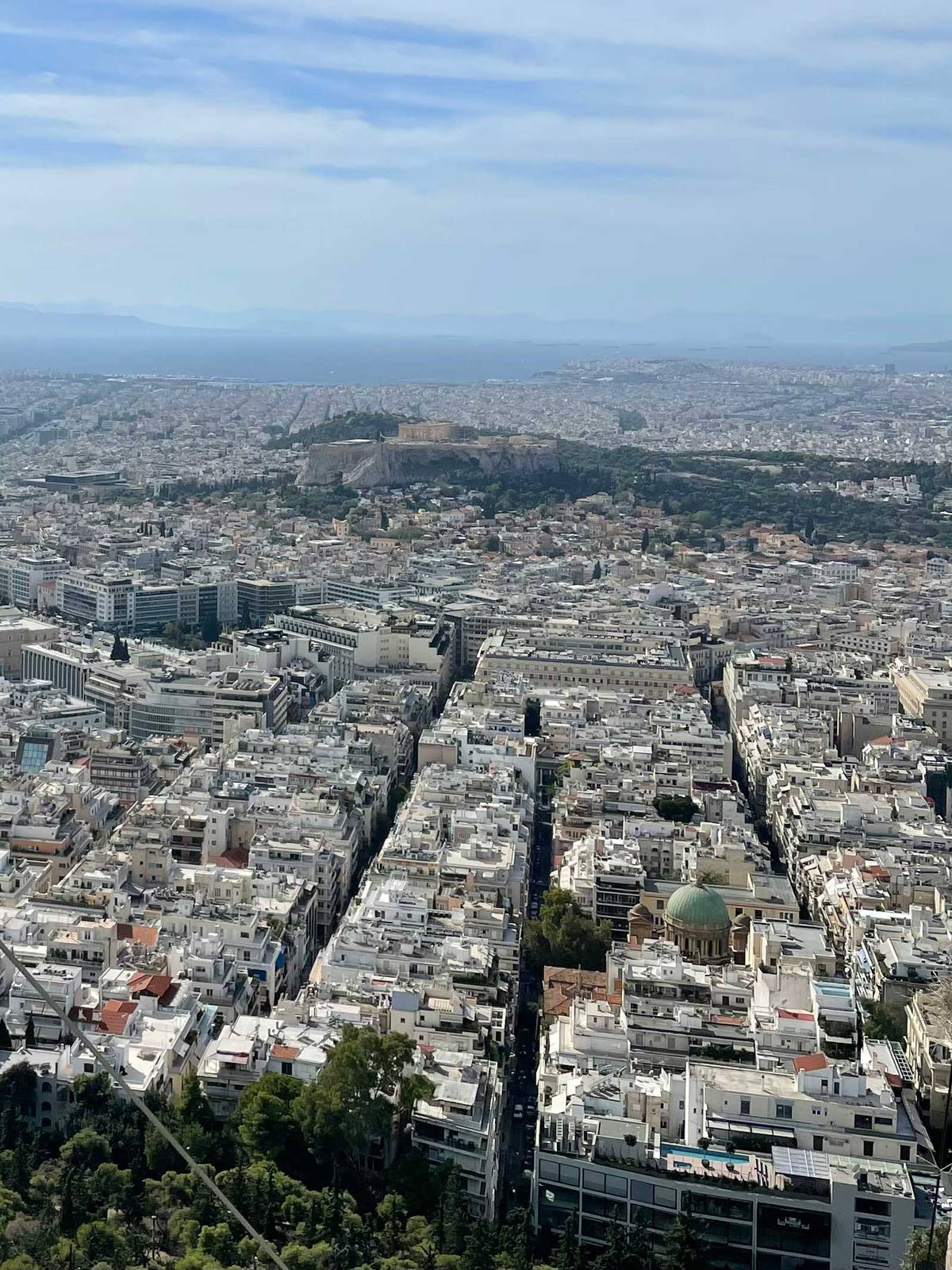Going Home Again
Our family left Israel for Greece after the Hamas attack, not quite refugees and not quite tourists. After four weeks away, we were ready to head back to Tel Aviv.

Courtesy the author

Courtesy the author

Courtesy the author
What just happened?
Last week, we returned to Israel after four weeks abroad, during which we lived in four different Airbnbs, first in the Greek island of Rhodes, then in Athens. We left Israel five days after Oct. 7 with no return ticket. We didn’t know how long we would stay, never planning more than a few days ahead. We packed light, but took lots of books, just in case. We weren’t sure what weather to pack for—who knows how long we’ll stay?—but made a point of not taking any T-shirts with Hebrew writing on them, for the sake of “keeping a low profile.”
On Oct. 7, all of our plans for tomorrow and for the foreseeable tomorrows had been erased, or at least put on hold. We were extremely lucky; nothing horrendous happened to us personally, but our lives suddenly, and unexpectedly, spun out of control. The idea was to get out of here, and to get the kids out of here, as fast as possible. The Israeli business newspaper The Marker claimed at the beginning of November that more than 230,000 Israelis left the country since the beginning of the war; we were among them.
Copycat syndrome was at work here. After the initial shock, we saw that some of our friends were packing to leave, so it seemed like the right thing to do. Others left because we left, and so on. When nobody knows anything, you blindly imitate. Rhodes was more or less chosen in the same manner. We didn’t ask our friends why Rhodes—we assumed it’s the only flight they managed to book. Friends who followed us there didn’t ask why Rhodes, either.
It wasn’t easy getting a flight out of Israel (there were flights mostly to Rhodes, Athens, and Cyprus) just as it wasn’t easy for Israelis abroad who attempted to return, to join the war effort or to reunite with their families, to do so. It wasn’t easy getting on the flight either. We waited in line at the airport for hours on end, long after the scheduled departure time, not knowing until the very last moment whether the flight would be canceled or if we’d succeed getting on it.
We started our journey in a nice big Airbnb for three families in the old city of Rhodes. During the first few days we were in a state of shock. The kids played hide-and-seek while the grown-ups sat together, trying to digest what had just happened. I cried frequently, as did the other mothers. We all felt sad, helpless, confused, and lost (which is how we feel now that we’re back, too), but the mere fact that we asked ourselves how we’re feeling seemed self-indulgent and inappropriate. We kept reminding ourselves: We are the lucky ones, the luckiest of the lucky ones.

Courtesy the author
The moment I landed I boarded an emotional roller coaster—one minute I’m at the beach or eating souvlaki; the next I lock myself in the bathroom so the kids don’t see me cry. The mind races between practical considerations (should I freeze my gym membership?) to thoughts about what happened to us, what happened in our country, what is happening in Gaza, what will happen next, and from now on. At first this induces panic attacks, and a vertigolike sense that you just can’t wrap your head around it; later a sort of numbness kicks in. After a while, the manic-depressive mood plateaued into a mellow kind of melancholy.
After a few days of asking what just happened, the question changed to “what’s next?” Many people we know took connecting fights from Greece or Cyprus to various other destinations throughout Europe or even the U.S. Some went to stay with family or friends in different countries. Those who can work remotely swiftly changed their status to digital nomads—but we lost most of our income. We didn’t know what we were. We referred to ourselves as refugees half in jest. We were not refugees. In this war there are real refugees: Over 100,000 Israelis were evacuated from around the Gaza border and the northern border to central Israel, as well as 1 million Palestinian refugees in Gaza. However, we weren’t tourists, either. We were in limbo.
I started making lists in my head.
Ways in which we resemble refugees:
We left our country in a haste without a plan.
We didn’t really care where we’re going.
We don’t know when we’ll return.
Most of our income suddenly disappeared.
When locals ask where we’re from and we tell them, they hug us and say they’re so sorry.
Ways in which we don’t resemble refugees:
We left of our own free will.
We have credit cards.
We’re planning on going back to our country soon.
Ways in which we resemble tourists:
We go to restaurants.
We visit tourist attractions and take lots of pictures.
Ways in which we don’t resemble tourists:
Some of us continue working remotely.
We frequently do laundry.
We took a carry-on bag full of schoolbooks.
The kids have school on Zoom in the mornings.
We’re sad and worried.
It is extremely disconcerting not knowing why you are where you are, what you’re supposed to do now, and where you’ll be the next day. Especially for parents. In an attempt to make sense of the situation, I started writing a diary, which I soon abandoned. I wrote for myself and vehemently refused to publish my ruminations. My privilege felt somehow disrespectful, as though by sharing my personal experiences I might be trivializing the real pain people are enduring at this time.
But now, after a month, I suddenly feel I can talk about what we went through. If 230,000 Israelis (probably more since the last count) are experiencing things similar to those that I did, it is worth discussing.
My diary entry from Oct. 16:
Today is Monday. I’m pretty sure. We have been here, in the old city of Rhodes, for four-and-a-half days that feel like eternity and like the blink of an eye at the same time.
We arrived here on Thursday. Privileged refugees. It’s a strange, postmodern concept. Perhaps like the victims of last Saturday’s massacre, who were slaughtered by terrorists while dancing at an outdoor party—beautiful youngsters, with crop tops and dolphin tattoos who met their death in the most gruesome manner while celebrating life. They had the worst trip anyone could imagine, and nobody could imagine.
Like Ernest Hemingway wrote about going bankrupt in The Sun Also Rises—Israel’s disaster came gradually, then suddenly.We knew we were sitting on a powder keg, but we chose to repress the thought. Now we jumped off. For now. It’s too early to determine when exactly on the catastrophe timeline we jumped. We jumped out of fear that the worst is still ahead of us, or that this continuous evil will stretch over such a long period of time that it might seep into our souls and those of our children and contaminate it.
We were a few families living together like in a commune, while others lived nearby. One of us did the cooking, another the grocery shopping, the third the laundry. The kids sat around a big table in the morning, attending their classes on Zoom. In the afternoons and weekends, we tried to enter tourist-mode. Drinking ouzo and swimming in the deep blue sea certainly helped to repress haunting thoughts.
We moved from place to place, always looking for cheaper accommodation and for apartments closer to other Israeli friends with kids. Less snobbish Israelis than us joined the local Israeli WhatsApp and Facebook groups in Rhodes and Athens. Right after Oct. 7, Israelis opened groups like those in countless cities around the world, to provide a support system for others like them arriving in the same locale. These groups offer information, discounted apartments, hand-me-downs, Israeli babysitters, baby strollers, Hebrew books, etc. They tell you which neighborhoods are best for Jews to avoid and connect you to local pharmacies that agree to fill Israeli prescriptions. Israelis abroad started opening makeshift Israeli schools and day care, Pilates classes, what have you. A few days before, all of these people were at home, living their normal lives, and suddenly they find themselves in a strange city, not knowing how temporary their temporary situation is.

Courtesy the author
This question nagged at all of us. One dilemma, for instance, was how long to book our next Airbnb for. If you book for longer, it’s cheaper per night, but you don’t want to lose hope that in a few days you’ll be able to go back home. This seems laughable. Of course, we were able to go home. Israel is still there after Oct. 7. But what kind of home is it if instead of safety and comfort it gives you fear, mourning, and anxiety?
We took our fear, mourning and anxiety with us to Greece, but still—we could take long showers without the dread of a siren interrupting, and knew that if, God forbid, the war escalates, we are at a safe physical distance. People back home generally said that it’s good that we left to “lehitavrer,” meaning “to take a breather.” Is that what we were doing? This terminology that became commonplace got on my nerves. We were totally discombobulated—this didn’t feel like a breather.
If once we would discuss music, film, and literature, or just gossip, all talk now was reduced to war and politics, informing each other of people we know whose loved ones have been killed or taken hostage (everybody knows somebody). The scariest gesture during this time was seeing one adult quietly and discreetly showing another adult their phone. That’s usually how each of us learned about the atrocities. “What happened?” the kids would ask us if they noticed the color suddenly draining from our faces. “Nothing, I’m just tired,” we lied.
We also sat together, contemplating our situation and weighing our options—for the short and long term. Each family had their own unique situation, depending on the number of children, the kids’ ages (small ones are simpler to move around and it’s easier to hide reality from them), and the need to pay rent or a mortgage in Israel, in addition to financing this strange getaway. Some lost their income, some were working remotely, some have savings while others have debts, some have a boss pressuring them to return or a spouse back home. Many women left with the kids while their partners remained in Israel due to work or reserve duty. We also encountered divorced couples that fled together—for the sake of the children.
The idea of emigrating, or “relocating” as it is called nowadays, was also discussed. Foreign passports, visa possibilities, job prospects—everything was dissected, even though what we really wanted was there to be peace, real peace, at home. Destinations were rejected one by one, due to immigration policies (damn Brexit), weather (too cold), language (Portuguese seems difficult), antisemitism, “free Palestine” rallies, large Muslim populations, earthquakes, etc. The great big world suddenly seemed small and altogether unwelcoming. Greece was lovely, but what connection do we have to Greece? This is a holiday destination, not real life. And with each day that passed from that dreadful Saturday, real life slipped further and further away.
Our reality check was supposed to be our friends and family in Israel, but they changed their tune each day according to the news. Some days they wrote us, “it’s much safer to be in Israel than abroad”; other days they said, “better stay there a while longer.”

Courtesy the author
We waited for a sign that we could go back home. When it became clear that the war wouldn’t end so soon, we were willing to accept a vaguer sign. We waited to hear Biden’s speech, then Nasrallah’s speech. We dreaded the IDF entering Gaza but waited to see what would happen if and when it did. Each few days we identified a new landmark that might indicate if it’s OK to return—whatever that means. The question “when will it be OK?” turned into “will it ever be OK?” We soon lowered our expectations from getting an all-clear to anticipating a signal that it’s “OK enough.”
Signs weren’t easy to find since we were uncertain what exactly we ran away from. Is it from living with sirens and running to the bomb shelter? Is it from the fear of escalation? Is it so that the kids won’t see the posters of the hostages that are plastered on every wall in Israel? Is it to keep them from danger or to shelter them emotionally? We were becoming unsure of what might ultimately cause them more psychological harm: being in Israel at a time like this or seeing their parents running away, confused, not being able to give them answers to simple questions like “where am I going to be tomorrow?”
In the end, we didn’t get a sign at all. Time just passed. In many families the dad and the older kids wanted to return while the mom wanted to stay. But I gave in and ultimately agreed that it might be fairly reasonable to go back, even though the Tel Aviv Cinematheque—where my partner and I work—is still closed.
Four weeks passed, the war is still going on, the hostages haven’t been freed, but friends and family back home said it’s not so bad, you get used to it. We were throwing away money, so we just decided to go back. Some of our friends returned a few days before or after us (copycat syndrome again), while others are still holed up somewhere, or moving from place to place, frantically searching for a little peace of mind or for hope for a better future, somewhere else.
After we booked our flight back home, we felt relief. Not because we’re returning to a war zone, just because the feeling of not knowing where we’ll be tomorrow was lifted. We were able to relax and the last few days felt almost like a real vacation.
After four weeks we were back at Ben-Gurion Airport, which looked practically deserted and was peppered with signs directing to the nearest shelter and posters of the hostages. A siren caught us on the highway on our way back to Tel Aviv from the airport. Our cab stopped under a bridge, and we jumped out and sat on the ground.
Dana Kessler has written for Maariv, Haaretz, Yediot Aharonot, and other Israeli publications. She is based in Tel Aviv.